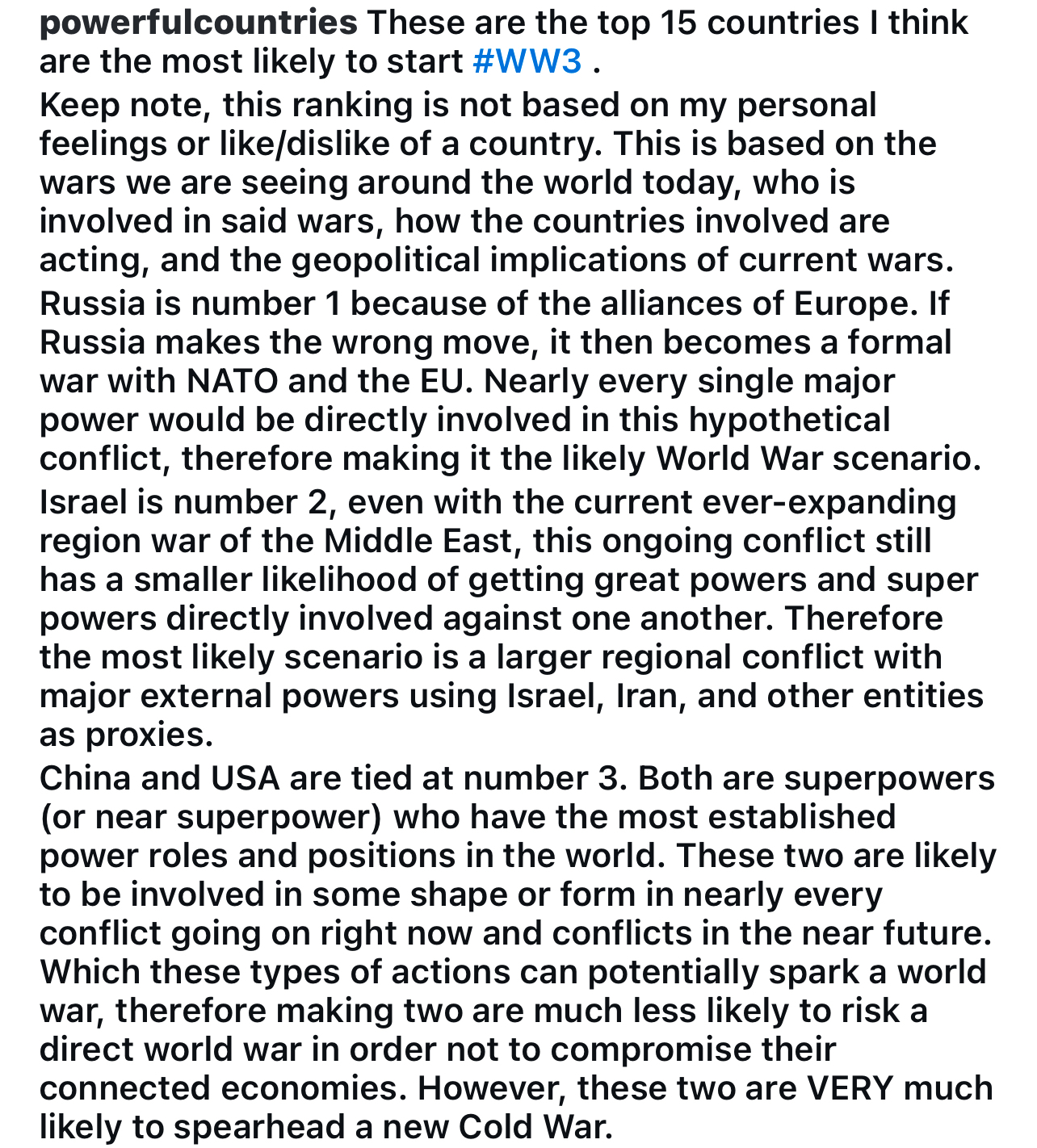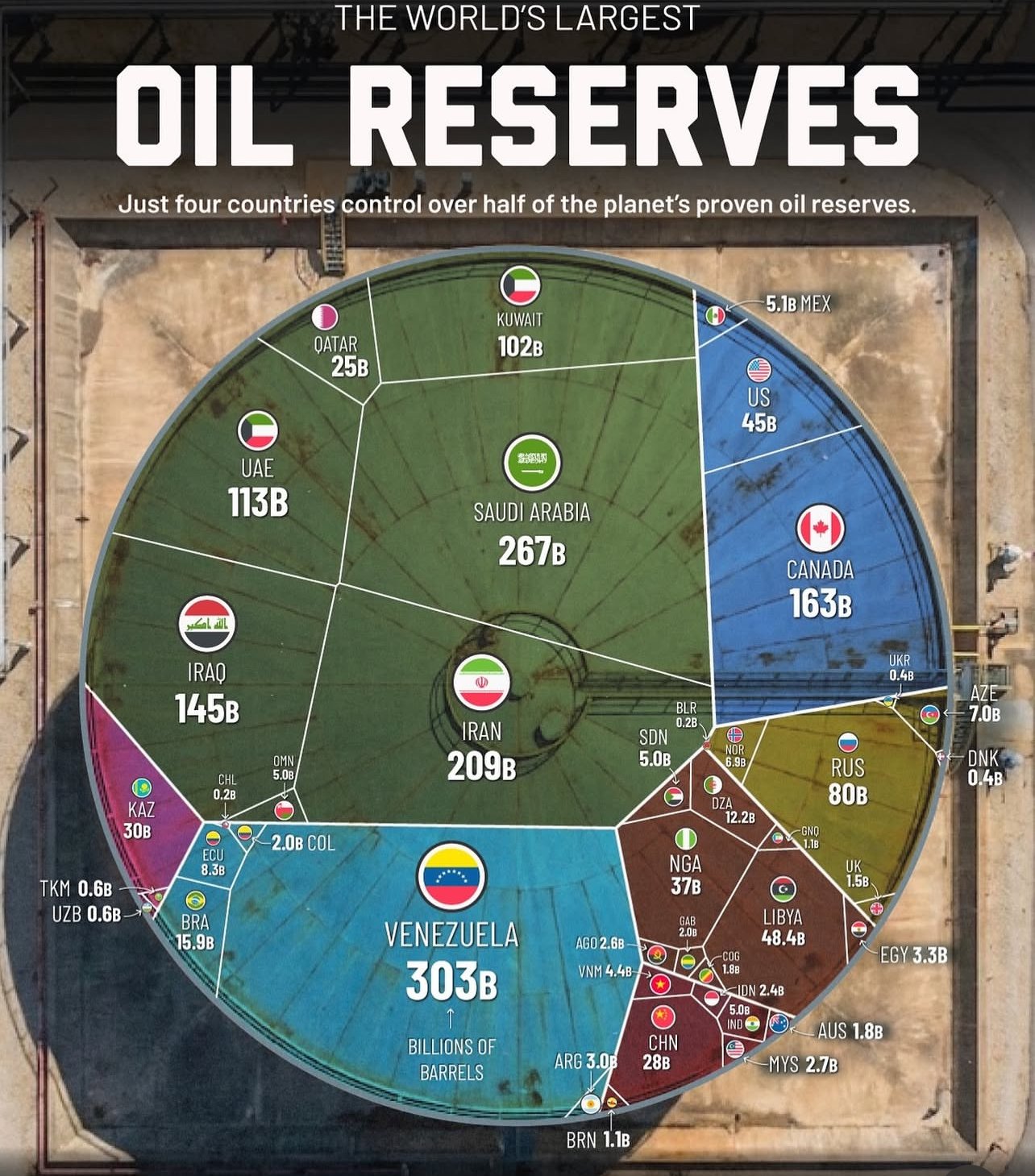GEOPOLITICS (educational purposes only)
Comments
-
Interesting read, I was surprised be how little of u.s. GDP is from manufacturing.
BRICS expands with 9 new partner countries. Now it’s half of world population, 41% of global economy
https://geopoliticaleconomy.com/2024/12/25/brics-expands-9-partner-countries-population-economy/
1 -
Not too surprising, really. Remember back in the 90's when the Democrat president and the Republican congress collaborated to send all the mfg. jobs overseas? That way, they could charge the same prices, while putting the difference into the pockets of the CEO's, and crippling the American worker to make us more malleable.
So, here we are. Victims of the Oligarchy. And everyone acts surprised, and pretends it's "the other sides" fault. I think it may have been the last truly bipartisan thing our government has done.
Rant over. Sorry for any hurt feelings, like if someone thinks that "their side" wasn't involved, but, they were.
"If you do not read the newspapers you're uninformed. If you do read the newspapers, you're misinformed." -- Mark Twain4 -
@Amos_Umwhat said:
Not too surprising, really. Remember back in the 90's when the Democrat president and the Republican congress collaborated to send all the mfg. jobs overseas? That way, they could charge the same prices, while putting the difference into the pockets of the CEO's, and crippling the American worker to make us more malleable.So, here we are. Victims of the Oligarchy. And everyone acts surprised, and pretends it's "the other sides" fault. I think it may have been the last truly bipartisan thing our government has done.
Rant over. Sorry for any hurt feelings, like if someone thinks that "their side" wasn't involved, but, they were.
Both the left wing and the right wing are attached to the same bird of prey.
3 -
Wow I thought US manufacturing was lower than 10% of our GDP. I was expecting between 5%-7%.
Not surprising we have the highest healthcare spending and healthcare has a significant slice of our GDP. I sure wish the quality equaled or surpassed the spending. Wishful thinking, I know.
1 -
Another perspective about what's cooking this year:
EURASIA GROUP'S TOP RISKS FOR 2025
Top Risks is Eurasia Group's annual forecast of the political risks that are most likely to play out over the course of the year. This year's report was published on 6 January 2025.https://www.eurasiagroup.net/issues/top-risks-2025?utm_source=semafor
1 -
This was posted on Facebook by a Ukrainian woman I follow. It's long, but I think she makes a good point.
Do Not Appease Evil
An open appeal by Ukrainian public figures
to the world leaders and the international community:
The new year 2025 brings many uncertainties yet much hope to Ukraine and Europe as we try to find a straightforward solution to a complex problem: how to end the big war. As Ukrainian public figures and intellectuals, we address the world leaders and the international community in order to share our perspectives on the forthcoming challenges and expectations.
Above all, we would like to emphasize that acquiring additional territories is not Russia’s primary objective in this war. It already has vast undeveloped territories, and when it seizes a new land, this land is systematically neglected. Similarly, the objective is not merely to bring Ukraine back under its control. This is only one of the intermediate goals. Russia’s ultimate aim is to break the current world order.
It seeks to regain its status of a superpower that acts arbitrarily and, by the right of the stronger, attacks neighbors, interferes in the affairs of other countries, commits terrorist acts, supports authoritarian regimes and illegally armed groups around the world.
None of this is an isolated incident, a whim of Putin, or a temporary “deviation from normalcy.” It is a part of a strategic design. This is why, three years ago, Putin issued an ultimatum to the United States and its allies in Europe, demanding a return to the 1997 disposition.
Ukraine, by reason of its history and geography, has become the next target on the way to realization of these revanchist intentions.
For Ukraine itself, this war is existential: it is a war for survival of the Ukrainian nation, society, and state. Ukrainian democratic and Russian authoritarian-imperial political visions are essentially mutually exclusive. That means that any ‘freezing’ of the conflict at this or that demarcation line will not lead either to a relief of tensions or to the establishment of sustainable peace.
For Russia, such a freeze would primarily signal the weakness of the West and encourage further aggression and wars that spill the blood of Europeans and Americans. Sustainable peace will come only when, under the combined pressure of Ukraine and its allies, Russia faces a systemic crisis and the defeat of Putin’s regime. As proven by history, tyrannies are fragile.
This war is not confined to Ukraine, nor can the ‘Ukrainian question’ be solved exclusively within the framework of Russian-Ukrainian relations. If the world leaders demand concessions of the territories and sovereignty from Ukraine without providing any effective security guarantees, they will essentially bring about Ukraine’s defeat, which will signal to China and other revisionists that they can seize what they want.
North Korean troops will appear in different hot spots. Piracy, blocking of trade routes, attacks on information systems and global communications will sabotage global trade.
Longstanding efforts to limit the spread of nuclear weapons will be reduced to naught. Russian media influence, cyberattacks, covert operations, and election interference in democratic countries will undermine the world order. And the possible fall of Ukraine would create a large wave of refugees and open the way for Putin to advance farther westward.
On the other hand, an effective end of Russian aggression against Ukraine could be a solution to many problems of the democratic world. Russia’s defeat in its war of aggression against Ukraine would reestablish the order based on rules and interdependence of responsible players. The security of global trade, global nuclear energy, and food security will be strengthened. Terrorist regimes and organizations around the world will lose Russian support and weaken.
Today, Ukraine is buying time for the democratic world to unite and strengthen. But this time is not limitless. The forces defending peace, freedom, and human dignity must go on the offensive. Ukraine and the entire democratic world can only win together or give in and lose together. The illusion of peace at the cost of shame has repeatedly brought on a new war.
The strength of a democracy is the ability to learn from past mistakes. Ukraine, too, has fought—and continues to fight—its way to democracy through trial and error. It is paying an exorbitant price along the way. Each and every one of us has relatives and friends that lost property, their health, or even their lives.
But we understand that the price of war will be even higher if our allies are seduced by the illusion of stopping the war without addressing its causes. And this is not only for Ukraine, but for the entire world. That is why we urge our partners to look for a way not to appease the aggressor, but to win together.
Evil cannot be appeased. It must be defeated and punished for the sake of a secure future of Ukraine, Europe, and the entire world.
January 5, 2025"I could've had a Mi Querida!" Nick Bardis3 -
Here’s a little follow up read. That came from Ukrainian officials. This shows a little different side. I’ve said since day one and people have laughed. This is because of NATO expansion.
If it don’t bother me, it don’t bother me. Just leave me alone.
2 -
⬆️⬆️ Both are correct. In summarizing …the essence of geopolitics in a nutshell ⬆️⬆️
1 -
Outer space geopolitics. Astro politics. Intergalactic politics. Whatever you want to call it. Another rabbit hole of geopolitics. Of course, tip of the iceberg so to speak.
https://www.tandfonline.com/doi/full/10.1080/14650045.2020.1803285
https://newspaceeconomy.ca/2023/04/03/the-new-frontier-geopolitics-of-outer-space/?amp=1
https://daily.jstor.org/challenging-the-hegemoon-the-geopolitics-of-space-infrastructure/
https://www.researchgate.net/publication/346663782_Critical_Geopolitics_of_Outer_Space
https://www.rsis.edu.sg/rsis-publication/rsis/the-geopolitics-of-outer-space-can-singapore-do-more/
0 -
Those are interesting memos, for sure.
-I think most in the West don't understand how Russia thinks.
-I think of NATO more in terms of defense and don't see how it's a threat to Russia, but again, I don't understand.
-What came first, the chicken or the egg; is NATO needed because of Russia's ambition or is Russia's ambition due to NATO's expansion? I was a union member for years, and a similar dynamic (in my mind, at least) existed; the company hated the union but the company's antics was the only reason the union existed.
-This will be fun fodder for vHerf some night.
"I could've had a Mi Querida!" Nick Bardis2 -
@peter4jc said:
Those are interesting memos, for sure.-I think most in the West don't understand how Russia thinks.
-I think of NATO more in terms of defense and don't see how it's a threat to Russia, but again, I don't understand.
-What came first, the chicken or the egg; is NATO needed because of Russia's ambition or is Russia's ambition due to NATO's expansion? I was a union member for years, and a similar dynamic (in my mind, at least) existed; the company hated the union but the company's antics was the only reason the union existed.
-This will be fun fodder for vHerf some night.
Using a union is a great analogy. Antics of a company are usually the cause; however, many of those unions do not do as intended and overstep their bounds imo.
I have just always found is curious that the reasons giving for forming NATO were to protect against the Soviet Union after WWII. I just find it odd that one, we were. not at war with the Soviet Union, and two, had it not been for the Soviet Union we probably would have lost the war in Europe.If it don’t bother me, it don’t bother me. Just leave me alone.
2 -
Peter Zeihan…American Imperialism
American imperialism is not the same as European imperialism. The Europeans wanted power, prestige and economic gain, while the US was in it for security. So, what will this look like for the Americans moving forward?
With current strategic holdings in places like Guam, the Northern Mariana Islands, and American Samoa, further expansion in Asia is more of a nice-to-have, than a need-to-do. Should the US want to make some moves, here are some of the places and considerations that would be involved.
Places like Sao Tomé and Principe, the Azores, and Canaries have some nice positioning for Africa, and Socotra could be valuable for Middle Eastern operations. Then there are some places that bring in another layer of risk, but offer some big incentives - Panama for the canal, Greenland for strategic positioning, or Iceland for importance in the North Atlantic. Cuba and Singapore are interesting, but more complicated. There's some obvious history with Cuba that makes involvement spooky, but having a foothold would make national defense downright breezy. Tampering with the very solid security partnership with Singapore seems too risky, but having a firmer foot in Southeast Asia could be important in a deglobalizing world.
Yet to existing cooperative security arrangements, the US already enjoys the benefits of influence in almost all of these places without the need for boots on the ground, much less the grinding migraines that come from actual occupations. Expanding into new territories would require managing populations and infrastructure, which could weaken US strategic stability and risk turning allies hostile. What I'm getting at here is if it ain't broke, don't fix it.
1 -
-
Greenland saga 😔
0 -
Let’s see what the economic ripple effects result from these US sanctions.
https://www.arctictoday.com/paralysis-looms-over-russias-arctic-oil-2/
0 -
China has no chance.
The Chinese are stockpiling resources - food, fuel, and materials - to help it endure a protracted conflict with the US. Is this something to be concerned about?
If China wants 120 days of stockpile, good for them, but it's not going to help. China is completely import dependent; they rely on imports for energy, food, and raw materials and their economy is tied to the global supply chain. As soon as war breaks out, all that is going away.
Even if China has a 120-day stockpile, it's not going to be very secure. Oil will be vulnerable to attacks. Food will be subjected to poor storage infrastructure and will likely spoil. So, that 120-day stockpile isn't looking so strong anymore.
And if you start to factor in naval blockades, no access to US markets, and the power projection of the US, this stockpile quickly turns into the same smoke and mirrors that the Chinese are so great at.
0 -

 1
1 -
 1
1 -
Northern Sea Route and Russia
https://www.arctictoday.com/hidden-strategic-costs-of-the-northern-sea-route/
0 -
-
You think China and Russia alliance is copacetic? Geopolitically, it’s a race for leverage.
https://thediplomat.com/2025/04/the-sino-russian-alignment-stops-at-arctic-trade/
3 -
look out! Finland.
3 -
@silvermouse said:
look out! Finland.NATO snuck in Finland’s membership in 2023 so they don’t need to worry. Everyone seems to forget that the whole Russian/Ukraine thing is over NATO.
If it don’t bother me, it don’t bother me. Just leave me alone.
2 -
@Rdp77 said:
@silvermouse said:
look out! Finland.NATO snuck in Finland’s membership in 2023 so they don’t need to worry. Everyone seems to forget that the whole Russian/Ukraine thing is over NATO.
100% correct.
0 -
Is NATO as powerful as it once was? Seems like they should be more powerful now, and yet I am not sure of it. Why are approximately 1/3 (this may vary) of NATO members not living up to their financial obligations?
1 -
My opinion is NATO is watered down. Its strength comes from the sum of its parts so to speak. Topic agreement among many members equals strength. Topic disagreement among many members equal luke warm. I think you get the gist of my point. Bottom line the big geopolitical players carry weight and direction NATO will follow.
1 -
 1
1 -
Map of the political flat earth.
1 -
@silvermouse said:
Map of the political flat earth.Sad truth…It’s all about who controls the most natural resources, GDP (import/export) of those resources and manipulation of governments.
0







 https://youtu.be/6e_axmH0UHk
https://youtu.be/6e_axmH0UHk